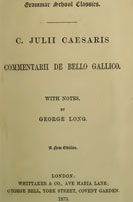Commentarii de Bello Gallico
“The adventures related in the literature of the Wild West were remote from my nature but, at least, they opened doors of escape. I liked better some American detective stories which were traversed from time to time by unkempt fierce and beautiful girls. Though there was nothing wrong in these stories and though their intention was sometimes literary they were circulated secretly at school. One day when Father Butler was hearing the four pages of Roman History clumsy Leo Dillon was discovered with a copy of The Halfpenny Marvel”
-“An Encounter” (D 20)
The schoolboys of “An Encounter” find adventure in the pulp periodicals of The Union Jack, pluck, and The Halfpenny Marvel. Joe Dillon, the future priest in the story, has a library of these titles that circulate secretly among his friends. However, a more substantial book acts as a foil to these inexpensive periodicals that sparked the boys’ imaginations and prompted their play. Father Butler directs his students to a page from their Latin lesson, leading his students saying “Hardly had the day . . .” and beckoning them to continue the reading. The class appears to be reading from Julius Caesar’s Commentary de Bello Gallico, a text noted for its historical record and straightforward Latin appropriate for the teaching of the language.
While in the process of questioning his students about Caesar’s text, Father Butler discovers the copy of the Apache Chief in Leo Dillon’s pocket. This boys’ magazine stands in contrast to the classical work, leading Father Butler to comment on the cultural status of popular literature at the time:
—What is this rubbish? he said. The Apache Chief ! Is this what you read instead of studying your Roman History? Let me know find any more of this wretched stuff in this college. The man who wrote it, I suppose, was some wretched scribbler that writes these things for a drink. I’m surprised at boys like you, educated, reading such stuff. I could understand it if you were . . . National School boys. (D 10)
Unsurprisingly, the priest privileges Caesar over quickly-penned and often formulaic adventure tales; nevertheless, Butler goes a step further by calling into question the morality and economics of pulp authorship. The writer of the Apache Chief is reduced to being a hack and drunkard, and by association his readers are similarly enfeebled in mind and spirit. The priest is willing to believe that the lower strata of society would resort to this sort of entertainment, but he has higher expectations for the pupils at Belvedere College.
This volume of Caesar’s commentaries on the Gallic wars was specifically designed for use in a grammar school, and the explanatory apparatus will be familiar to many readers of Joyce who reach often for the various annotations, commentaries, and summaries that accompany his texts.

